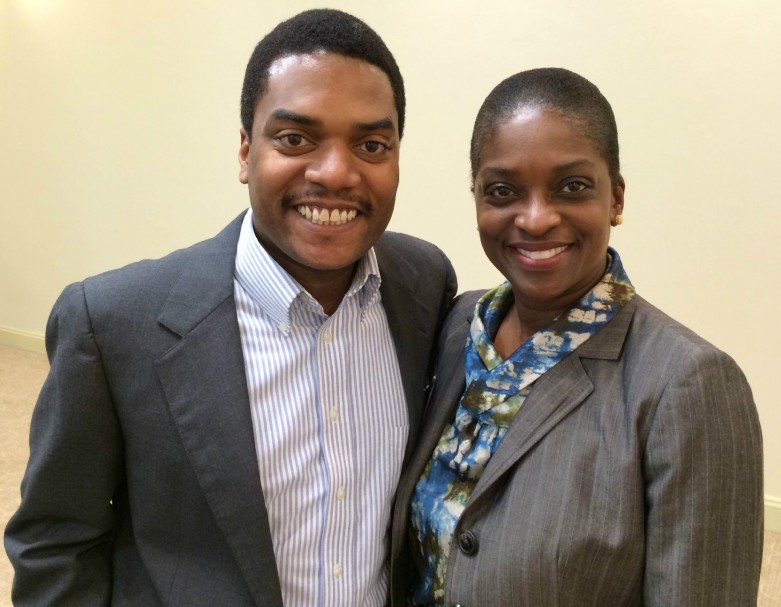
Hey FCC --- Break Out of Your Washington Bubble!
In the past few weeks, support for Net Neutrality has reached historic levels — with Senate Majority Leader Harry Reid and the president himself opposing the kind of paid prioritization FCC Chairman Tom Wheeler’s plan would allow.
And people around the country are calling on the five members of the FCC to hold public hearings in their communities on Net Neutrality — and on the Comcast-Time Warner Cable merger, which could also strike a death blow for the open Internet.
Inviting Commissioner Clyburn to Come Visit
This morning I had the pleasure of meeting with FCC Commissioner Mignon Clyburn — who has long advocated for involving the public in the FCC’s decision-making process. In a roundtable discussion featuring leaders from the community media, media arts and policy sectors, I highlighted the public’s call for the FCC to hold hearings around the country.
On behalf of more than 100,000 Free Press and Daily Kos members, I thanked Clyburn for her openness to meeting with the public and invited her to continue to do so this summer and fall. I also presented letters from the Writers Guild of America East and the Manhattan Neighborhood Network echoing that call.
Many of the leaders who joined us for this discussion offered to help organize such meetings. This group of experts is uniquely positioned to chart out a future where all of our communities have the media they need.
Commissioner: These Leaders Have Your Back
PhillyCAM Membership and Outreach Director Antoine Haywood (pictured with Commissioner Clyburn) said that the folks who visit PhillyCAM’s public access television facility need Internet access to use the full range of tools available and to come together as a community. He knows firsthand just how crucial Internet access is for people searching for jobs. He highlighted the need for the network to remain a level playing field for everyone. Commissioner Clyburn noted that she’s motivated by Haywood’s enthusiasm and work.
Sanjay Jolly of the Prometheus Radio Project talked about how his organization, which is supporting more than 3,000 Low Power FM stations that will start broadcasting in the next three years, provides independent, locally based and culturally relevant alternatives to the mainstream media. A closed Internet and further consolidation of Internet and cable providers, he said, would put LPFMs and the communities they serve at a disadvantage.
Center for Media Justice Executive Director Malkia Cyril talked about how legacy civil rights groups have come out in opposition to reclassifying broadband and in support of Comcast’s takeover of Time Warner Cable.
Cyril was quick to point out that the open Internet has allowed a new generation of leaders of color to own their own media outlets and speak for themselves online. This new wave of civil rights leadership that favors real Net Neutrality and opposes further media consolidation includes organizations like 18 Million Rising, which uses the open Internet to organize and promote civic engagement among Asians and Pacific Islanders.
Hannah Sassaman of the Media Mobilizing Project cited a PEW study that shows that 29 percent of Philadelphians are offline. Of those folks, 90 percent are poor people of color, seniors and immigrants who cannot get access to the media and technology they need. She talked about how Comcast’s Internet Essentials program — which Comcast used as a carrot to sell Washington on its 2011 merger with NBCUniversal — has been a giant flop.
Sassaman relayed the story of Audra Traynham, who qualified for the Internet Essentials program but couldn’t take advantage of its low-cost services because Comcast customers must turn off their Internet access for three months before they’re allowed to participate. Sassaman also talked about the campaign her organization is running, CAP Comcast, to stop Comcast from gobbling up more media and to instead deliver positive change to its home city of Philadelphia.
Christopher Casey of Consumers Union talked about the concerns his members have about the merger — which would lead to less competition and higher prices and would give one bad company way too much control over the future of the Internet. He urged the commissioner to block the merger.
Continue Pushing the FCC to Come to Your Community
I know that Commissioner Clyburn takes these stories and our invitations to continue meeting with the public seriously. During our discussion, she said that our comments and input are never too much for her. And in a speech following our gathering at the ACM/NAMAC conference, she noted that she sees herself as a champion in Washington, D.C., for those without lawyers.
We’re thankful for her commitment, yet we still need to push the commissioner and her colleagues to meet with us before they cast their votes on issues that will shape the future of our communications landscape.
It’s been more than five years since all five FCC commissioners left Washington, D.C., in an official capacity to hear how the agency’s policies affect real people. If you haven’t already asked the FCC to visit your community, please send your invitation today.
Photo: Antoine Haywood and FCC Commissioner Mignon Clyburn (credit: Antoine Haywood)